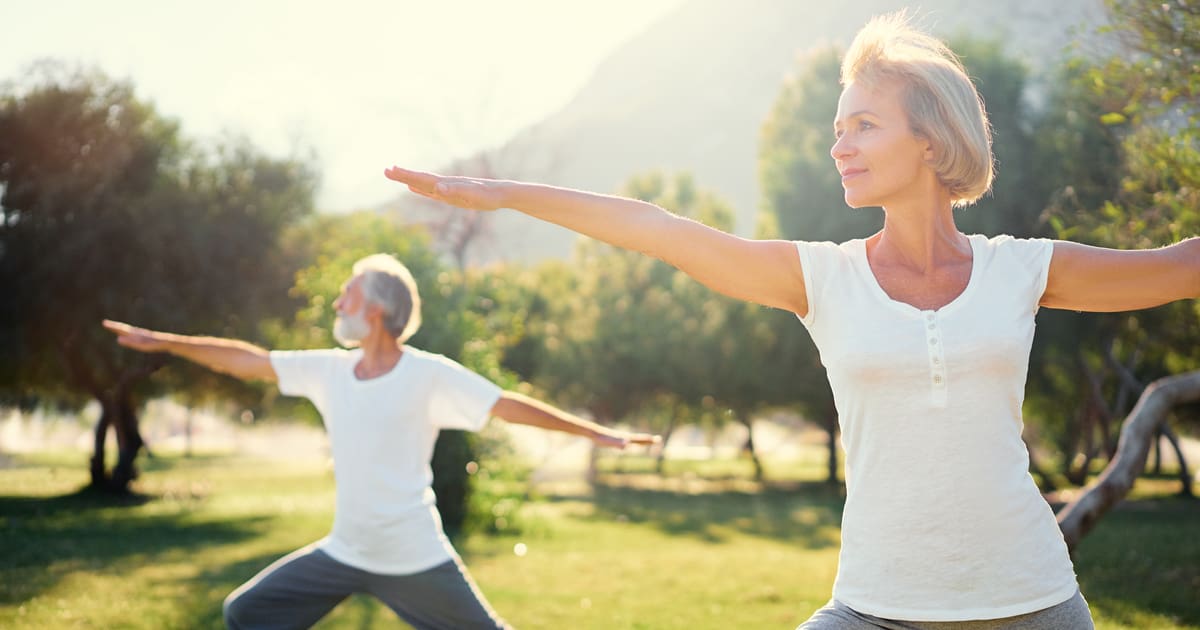Health
What Types of Yoga Are Beneficial for Anxiety?
Different types of yoga offer unique ways to combat anxiety. Hatha Yoga emphasizes mindfulness through physical poses and breathing, aiding in calmness.


Different types of yoga can help ease anxiety, each with unique benefits. Hatha Yoga promotes mindfulness and a calm mind through physical postures and breathing. Vinyasa Yoga links breath with movement, fostering emotional balance and stress release. If you prefer gentleness, Restorative Yoga offers nurturing support with props and long-held poses for deep relaxation. Kundalini Yoga awakens inner energy through breathwork and meditation, enhancing peace. Finally, Yin Yoga uses long-held positions to target connective tissues and promote stillness. By exploring these styles, you can find which resonates best with you for managing anxiety and its effects. There’s much more to discover ahead.
Article Summary
Hatha Yoga
Hatha Yoga, focusing on physical postures and breathing techniques, offers a calming practice that can significantly alleviate anxiety.
By engaging in Hatha Yoga, you learn to connect your mind and body, encouraging a sense of peace. Each pose helps release tension, while controlled breathing promotes relaxation.
As you practice, you’ll find that holding poses for longer periods allows you to cultivate patience and mindfulness. This grounding experience can help you manage anxious thoughts more effectively.
Remember to listen to your body and modify poses as needed to guarantee safety. You don’t need to push yourself too hard; instead, focus on gentle movements and deep breaths.
With consistent practice, you may notice a greater sense of calm and clarity in your daily life.
Vinyasa Yoga
Vinyasa Yoga offers a dynamic approach to managing anxiety through its flowing sequences that link breath with movement. This practice can help you cultivate mindfulness while releasing tension.
Here are three key benefits to take into account:
- Breath Awareness: Focusing on your breath during Vinyasa can ground you, promoting calmness and clarity.
- Physical Release: The continuous flow of poses encourages the release of stored stress in your body, helping you feel lighter.
- Mind-Body Connection: By synchronizing your movements with your breath, you create a deeper awareness of your feelings, allowing for better emotional regulation.
Engaging in Vinyasa Yoga regularly can help you feel more centered and balanced, making it a safe and effective option for managing anxiety.
Restorative Yoga
Restorative Yoga often provides a gentle and nurturing way to alleviate anxiety. This practice focuses on relaxation and mindfulness, allowing you to release tension and find calm. By using props like blankets, bolsters, and straps, you can support your body in restful poses that encourage deep relaxation.
During a session, you’ll hold each pose for several minutes, which helps you tune into your breath and body. This mindful approach creates a safe space to examine your feelings without judgment. You might find it easier to let go of racing thoughts as you settle into stillness.
Incorporating Restorative Yoga into your routine can help you cultivate resilience, improve self-awareness, and ultimately foster a greater sense of peace in your daily life.
Kundalini Yoga
Kundalini Yoga is a dynamic practice that aims to awaken your inner energy and promote emotional balance, making it particularly beneficial for managing anxiety.
This style incorporates breathwork, chanting, and movement, helping you release tension and connect with your inner self.
Here are three key aspects to focus on:
- Breath Control: Practice deep, intentional breathing to calm your nervous system and reduce anxiety levels.
- Meditation: Use guided meditations to cultivate mindfulness and foster a sense of peace.
- Mantras: Incorporate chants or affirmations to shift your mindset and reinforce positive thoughts.
Yin Yoga
Yin Yoga offers a gentle yet profound approach to alleviating anxiety through long-held postures that target the deeper connective tissues of the body.
In this practice, you’ll hold poses for several minutes, allowing your mind to quiet and your body to relax. This extended time in each posture encourages mindfulness, which can help you become aware of your thoughts and feelings without judgment.
You might find that the stillness allows you to release tension and foster a sense of calm.
It’s essential to listen to your body and modify poses as needed, ensuring your practice feels safe and supportive.
Incorporating Yin Yoga into your routine can be a nurturing way to manage anxiety and cultivate inner peace.
Frequently Asked Questions
How Often Should I Practice Yoga to Reduce Anxiety?
To reduce anxiety, you should practice yoga consistently, ideally three to five times a week. Short sessions can be just as effective, so listen to your body and find a routine that feels safe and supportive.
Can Yoga Be Combined With Therapy for Better Anxiety Management?
Absolutely, you can combine yoga with therapy for better anxiety management. This holistic approach allows you to address emotional issues while practicing mindfulness, enhancing your overall well-being and providing you with valuable coping strategies.
What Are the Basic Props Needed for Yoga Practice?
Did you know that over 80% of practitioners use props to improve their practice? To guarantee safety and comfort, you’ll need a mat, blocks, straps, and a blanket. These tools can help support your yoga journey.
Is There a Specific Time of Day Best for Yoga?
You can practice yoga anytime, but mornings often energize you for the day ahead. If evenings suit you better, that’s great too! The best time is when you feel most relaxed and focused.
Can Beginners Benefit From Yoga for Anxiety Relief?
Absolutely, you can benefit from yoga as a beginner. It helps you relax, reduces stress, and promotes mindfulness. Start with simple poses, focus on your breath, and you’ll soon notice positive changes in your mental well-being.


Hi, I’m Kyle Rivera, a news journalist and blog editor with the Daily Evening News. A TCU alum with a flair for storytelling, I spend my days uncovering impactful stories and my evenings exploring the realms of yoga, cycling, and whimsically bad poetry.
Travel is my escape; I’ve trekked from Tokyo’s neon lights to Iceland’s tranquil vistas. But no journey is complete without Mogli, my Golden Retriever, who’s redefining his breed standards in the most charming ways.
I love connecting with fellow travelers, yogis, cyclists, and anyone who enjoys a laugh at my poetic attempts. If you’re into stories that inspire, travel escapades, or just want to see what Mogli and I are up to, I’d love to hear from you on Instagram or Facebook. Let’s share tales and tips from around the globe!

